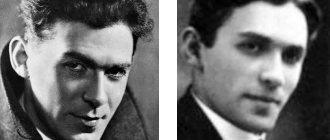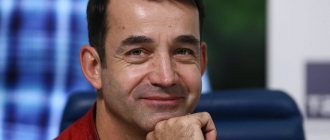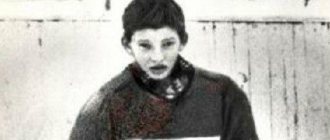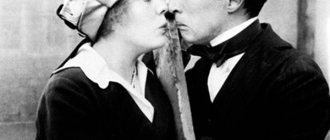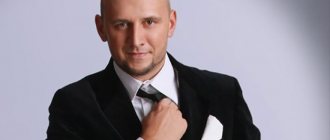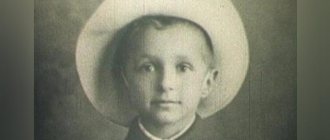Childhood and family of Luciano Pavarotti
Luciano Pavarotti was born in the small Italian city of Modena into the family of a baker and a cigar factory worker.
His family lived very poorly, and therefore there was always not enough money even for the most necessary things. Despite this, Luciano always spoke very warmly and reverently about his childhood. At an early age, our today's hero's favorite hobby was football. He dreamed of becoming a goalkeeper, but later abandoned this idea. Due to World War II, in 1943, the Pavarotti family was forced to leave Modena and move to one of the suburban farms. In this place, the entire family of the future great tenor began farming. And, surprisingly, at a certain point Luciano began to enjoy this kind of life routine.
Luciano Pavarotti in his youth
As for the love of music, it always coexisted in the soul of a young guy in parallel with other hobbies. The foundations of Luciano’s musical taste were laid by his father, who in his youth was also fond of opera singing. Fernando Pavarotti's personal collection included a huge variety of records with arias by Enrico Caruso, Tito Skip and some other performers. In addition, on Sundays, the father of our today's hero sometimes sang in the church choir. At a certain point, Luciano himself began performing with him.
This went on for many years, however, after graduating from high school, our today’s hero at first did not even seriously think about the career of an opera singer. He wanted to enter a sports academy, but Luciano’s mother convinced him to get a job as a teacher. So our today's hero became a music teacher in elementary school. He worked in this capacity for two years, but subsequently it was these years that finally allowed Luciano to understand how important the art of music occupied in his life. Pavarotti decided to become an opera singer, and at the age of nineteen he began studying singing with the famous tenor Arrigo Pola, who, by the way, even agreed to teach the young guy for free. After this, our today's hero also worked for some time on developing his vocal abilities under the guidance of Ettori Campogalliani.
Early life
Luciano Pavarotti, Known for his extraordinary artistry that helped expand the popularity of opera, he was born on October 12, 1935, on the outskirts of Modena in north-central Italy. The son of a baker and an amateur singer, the Pavarotti family was crammed into a two-room apartment. By 1943, World War II forced the family to rent a separate room in the countryside.
Pavarotti wanted to become a football star, but found himself enjoying his father's recordings of popular tenors from the days such as Bjorling, Tito Schipa and his favorite Giuseppe Di Stefano. At about age 9, he began singing with his father in a small local church choir. He also studied singing with childhood friend Mirella Freni, who later became a star soprano.
At the age of 20, Pavarotti traveled with a choir from his hometown to an international music competition in Wales. The group took first place.
Luciano Pavarotti and first wife
Music studies at one point introduced Luciano to his first wife, the aspiring opera singer Adua Veroni.
They got married in their youth, right after Luciano received his first performance fee. But then they separated pretty quickly. Many years later, Luciano Pavarotti admitted more than once that it was Adua who made him seriously think about a career in the world of opera. Luciano Pavarotti - Caruso Perhaps for this reason, after breaking up with his beloved, Luciano Pavarotti's career sharply declined. He performed very rarely, and at some point he even learned about a thickening that had appeared in his vocal cords, which at one point called into question his entire career. The singer's voice deteriorated greatly, but Luciano continued to perform. As a result, the concert in the city of Ferrara caused a hail of criticism and became one of the biggest failures in the musician’s life. After him, our today's hero decided to quit the world of music once and for all. He completely concentrated on his work as an insurance agent (which he previously worked in parallel with his musical career) and at some point completely gave up all performances.
Luciano Pavarotti - friends However, surprisingly, the thickening in the singer's larynx at some point suddenly resolved by itself. Moreover, it was after the illness that the musician’s voice acquired the desired depth and richness. Luciano Pavarotti could perform again. And in the end, it was this moment that became a turning point in his life and work. Star Trek
Opera debut
Pavarotti gave up his career in school and devoted his life to singing. He won the international competition at the Teatro Reggio Emilia in 1961, making his debut there in Rodolfo in La Bohème on 29 April. He made his debut in 1963 when he stepped into the role of tenor Giuseppe Di Stefano as Rodolfo at the Royal Opera House in London.
Pavarotti then took part in La Scala's European Tour (1963-64). His American debut in February 1965 in Miami's Doniasetti Lucia di Lammermoor also marked the beginning of his legendary partnership with Australian soprano Joan Sutherland. It was with Sutherland that Pavarotti took London's Covent Garden and the New York Metropolitan Opera by storm in 1972 with a sparkling performance Donizetti's favorite, La Fille du Regiment.
Pavarotti's voice and performance were very much in the powerful style of the traditional Italian tenor. He quickly became internationally famous as a concert performer, gaining a large following through his numerous recordings and television appearances.
In 1982, Pavarotti appeared in the film Yes, Giorgio. That same year he published a volume of autobiography.
Great success for tenor Luciano Pavarotti
Already in 1961, our today's hero won the main prize at the International Vocal Competition.
After him, Luciano Pavarotti made his debut on the stage of the prestigious Teatro Reggio Emilia, and very soon also appeared on the stage of the Vienna Opera and London's Covent Garden. From that moment on, the career of the Italian tenor began to move rapidly upward. He sang on the best stages of our planet. London, Vienna, Paris, New York, Marseille and many other major cities on the planet applauded him. In 1990, during the Football World Cup in Italy, Luciano Pavarotti performed his famous aria “Nessun Dorma”, which subsequently became very popular even among people far from opera.
Luciano Pavarotti's cause of death was cancer
It was at this moment that our today's hero was inflamed with the idea of popularizing classical music. Soon he, together with Placido Domingo and Jose Carreras, formed the Three Tenors trio, which performed classics in a more modern arrangement. This approach brought the singers enormous commercial success and made them genuine stars not only of the opera, but also of the pop stage. They were criticized, but they remained true to themselves. As a result, it was thanks to the work of the “Three Tenors” that the popularity of opera music in the nineties increased significantly.
In addition to musical performances, Luciano Pavarotti also worked as a philanthropist throughout his life. He worked closely with the Red Cross organization and also organized a number of music festivals to promote young musicians.
Kings can do anything: biography of Luciano Pavarotti
Luciano Pavarotti is one of the most outstanding opera singers of the century, who performed on stage for more than forty years. The doors of the best theaters were always open for him. The success he achieved has never been achieved by any vocalist. Luciano gathered stadiums of fans. His sunny timbre and special relationship with the audience made him exceptional. However, the maestro’s personal life has always caused mixed reviews. Is it only star fever that can explain the eccentric antics of the king of the upper C? Read more in the material of the magazine “Atmosphere”.
Journalists are no strangers to singing praises. Especially when the hero deserves it. And the genius Luciano Pavarotti is certainly one of those. He has rare vocal abilities - his voice is called “lyric tenor”. The wide range allows it to move smoothly from one register to another. Of course, I would like to say that all this was inherited, because his father sang in the choir in his free time, but no - one of the best vocalists of our time began his life’s journey differently.
The vocal star was born on October 12, 1935 in the small town of Modena, which belongs to the Italian province of Emilia-Romagna - the birthplace of Parmesan and wine. His father Fernando was the owner of a bread shop and loved to play music. The singing baker was a celebrity in the city. In reality, dad dreamed of being on stage, but he didn’t have the courage to realize his dreams. So he decided that singing was just a hobby. Our hero's mother Adele worked at a tobacco factory and dreamed of him going to teach at school.
View this post on Instagram
Posted by Luciano Pavarotti (@lucianopavarotti)Nov 30, 2020 at 1:47 PST
As a child, he was more interested in football; he wanted to be a professional goalkeeper. And after graduating from school, the future singer faced a dilemma. He was interested in continuing his career as a football player, but his mother still insisted on having her way. Luciano even stayed at school for a couple of years, but he played music in every free moment - this is what eventually prevailed. Moreover, it was simply impossible to hide such a voice from people.
First steps
Our hero's first performance took place when he was only four years old. He sang “The hearts of beauties are prone to betrayal.” The audience of grandmothers, aunties and mother were captivated. Later, at the house of one of their friends, the guys held singing competitions, in which Luciano became the constant winner. He always strived to be the first in everything - be it playing football, riding a bike or running a race. Sometimes he helped his friends charm girls by singing serenades under the windows. They stood near the house and opened their mouths, and Luciano in the archway gave out shimmers.
View this post on Instagram
Posted by Luciano Pavarotti (@lucianopavarotti) Apr 12, 2020 at 6:31 am PDT
One day, twelve-year-old Pavarotti was playing football with the boys barefoot and injured his foot on a nail. Blood poisoning began, he spent several weeks in a coma, but miraculously survived. To please his son after his recovery, his father took him to the Modena Opera for the first time, where the young man heard tenor Benjamin Gili. Luciano was shocked. Then he realized that he wanted to become not just famous, but a great vocalist. Sixteen years later this is what happened...
Luciano did not graduate from the conservatory, and newspapers wrote that the singer did not need to work hard: it was all about his colossal vocal abilities. But this is far from the truth: in order to “hone” his voice, Pavarotti spent a lot of time with teachers who, without changing his timbre, were able to engrave a real diamond.
The singer's career was rapid: already in 1961, at the age of only twenty-six, he took part in the competition of the Reggio Emilia Theater. The public had no doubts - it was the young talent in the person of Pavarotti who was supposed to receive the main prize - the role of Rudolf in Puccini's opera La bohème. This was his long-awaited debut on stage. Since then, this image has been one of the maestro’s favorites. And for good reason - he always liked to flaunt his achievements, because many vocalists achieve such heights already in old age. We can say that Luciano had already begun to become arrogant, but for now he kept his temper in check.
Cherche la femme
How can you write about an Italian without touching on his love affairs! Of course, they were in the life of our hero, but they were always overshadowed by the main woman of his life. He met his love in 1955 at a party. He was then twenty years old. To make an impression, Luciano performed "Swallow's Nest". He sang only for her - sixteen-year-old Adua, who was also fond of singing. Love survived the school years, and soon their engagement took place, which turned out to be long. At that time they worked as teachers. Luciano taught physical education and worked part-time as an insurance agent.
View this post on Instagram
Posted by Luciano Pavarotti (@lucianopavarotti) May 14, 2020 at 10:13 am PDT
And only thanks to Pavarotti’s achievements on the musical Olympus, the young people who had been living together for more than six years were able to get married. Luciano was not yet a vocalist earning huge money, but the fees were already enough for a modest wedding.
At times it seemed that the Italian did not pay much attention to his wife, because around him there were always many young singers and theater workers - his eyes ran wild. The result was that in 1964 he missed the birth of his first daughter, Lorenza. While Adua was in the hospital, our hero celebrated his success in Rigoletto with friends. Then he did not go with his wife to the hospital when she was expecting the birth of her second daughter, Christina. Apparently, he didn’t want to worry too much or he had more important things to do, so he came up with the formula: a mother plus an absent father equals a healthy child. So the third daughter, Juliana, was also born without him.
The singer was a very superstitious person and believed that if something “works”, nothing needs to be changed. If something brought good luck, he took note of it. For example, this was the case with the famous handkerchief, which became Pavarotti’s lucky talisman. Luciano believed that it would be a bad sign if he did not have a scarf with him at concerts. In addition, because of superstitions, he could not stand the color purple, never walked under stairs, and could not stand it if salt was spilled in his presence...
Beyond the seas
The young tenor was successful not only in his native Italy. At twenty-eight, Luciano went to London. He barely spoke English, but he tried to show off and not show his awkwardness - after all, he was already famous in his country and was waiting for appropriate treatment. There he again rehearsed La Bohème, but this time as an understudy for the star, Giuseppe di Stefano. He also stood in for diva Joan Sutherland's partner. The public didn't want to let him go.
View this post on Instagram
Posted by Luciano Pavarotti (@lucianopavarotti) May 9, 2020 at 2:24 PDT
Success in London inspired him and prepared him for a trip to Milan. And again there was La Bohème. However, La Scala theater rejected him twice. Pavarotti was furious, but conductor Herbert von Karajan stood up for him and demanded that he be at least replaced.
In 1967, the opera Daughter of the Regiment at the Royal Opera House in London made Luciano a legend. This time people came to hear him. Until now, not a single tenor has sung like this - nine top Cs in a row at the limit of the power of his voice. No one could believe it, especially since the notes sounded one after another with ease. This changed everything - Pavarotti achieved something that no one had managed before.
The sensation was repeated at La Scala, and finally triumph at the Metropolitan Opera. New York lay at the feet of the king of the upper C. The time for small fees is over, thanks in part to Pavarotti's new impresario Herbert Breslin. America made him a star, but his impresario wanted solo concerts. One of the performances at Carnegie Hall was sold out. For the first time, Pavarotti dared to combine arias with songs of his homeland. The audience was delighted. Now, after each appearance, Pavarotti was called at least fifteen times in a row!
From that moment on, our hero's life took place in the most prestigious theaters in the world, surrounded by famous conductors and the most illustrious colleagues.
However, Pavarotti's rise to fame did not come without difficulties. His quarrelsome character was legendary. He even earned a reputation as the “king of cancellations” because he often canceled shows at the last minute. I thought that such whims were permissible for a star of his caliber. And many theaters turned a blind eye to this, recognizing that the king has the right to eccentric antics. Only the Chicago Opera terminated its contract with him, since Pavarotti canceled twenty-six of forty performances there over the course of eight years.
Like clockwork
Pavarotti had a personal and creative friendship with two other tenors, Placido Domingo and Jose Carreras. Their creative trio originated in the nineties. At first, of course, there was some professional envy, but then the singers were able to find a common language, realizing that together they were able to achieve more. Even our hero managed to calm down his cocky temper for the sake of a common cause. They performed for the first time in Italy, in a concert dedicated to the World Cup, and here Pavarotti, who was a football fan, was finally able to take his soul away. This was exactly the moment when the singer felt that opera roles in his performance could become real hits.
View this post on Instagram
Posted by Luciano Pavarotti (@lucianopavarotti) Mar 5, 2020 at 12:13 PST
The beginning of his performances in large concerts in open areas dates back to the same time. In Hyde Park in London, it attracted one hundred and fifty thousand spectators, and even the rain did not hinder its success. In 1993, five hundred thousand people attended Pavarotti's concert in Central Park in New York. And in September of the same year, three hundred thousand gathered under the shadow of the Eiffel Tower, all for the sake of Luciano.
But those around the star constantly reminded him that making money only for oneself was wrong. His then secretary Nicoletta, knowing the character of her boss, carefully hinted that it would be nice to organize charity concerts. From 1992 to 2003, in his native Modena, the great tenor organized the charity show “Pavarotti and Friends,” gathering famous stars and performing in duets with them. The show contributed to the singer's even greater popularity, not to mention the number of people who were helped by the funds raised. But the performance of songs in the company of Sting, Mariah Carey, Elton John and Celine Dion led to the fact that Pavarotti’s opera aria began to sound like a pop hit. However, Nicoletta assured that he was on the right path. And for some reason Pavarotti believed this modest girl and consulted with her on all important issues.
His fame was at its zenith. There was even a semblance of a court around the king: just remember a certain Thomas, a former German sergeant, who was responsible for the ritual of the Maestro’s appearance on stage, as well as for the stools he needed, mineral water, for a buffet with tartines with salmon, cheese, ham and an abundance of fruit... In his youth, Luciano was physically attractive, but in the history of music he will remain an enormously fat man, wiping away the continuously flowing sweat with a handkerchief. Already in the seventies, Pavarotti’s weight reached one hundred and fifty kilograms. His appearance did not please him. It’s not for nothing that he didn’t appear on screen in full height, preferring close-ups. But this did not stop him from enjoying success with the ladies. Pavarotti, who had been married for a long time, did not deny himself carnal pleasures; he was like a sultan in a harem. He even starred in the comic film “Yes, Giorgio,” where he appeared as a caricature of an opera singer, who is only interested in young beauties and delicious food. However, it was not only the love of delicacies and wine that led him to gain weight. Everything turned out to be much more serious.
Luciano did not learn new roles, but interpreted his favorite roles: Nemorino in L'elisir d'amore, Richard in Un ballo in maschera and Rudolf in La bohème. And this was also seen as the whims of the star. However, no one knew that this behavior was associated with memory problems.
Figaro here, Figaro there
Adua was forced to submit to Luciano’s busy touring schedule for many years and, of course, knew about the affairs that the hot Italian intended. As a result, the passion cooled over the years; these were only people who knew each other well, ready to play feelings for show. But at some point Pavarotti stopped hiding his novels. So, in 1981, Madeleine Reni appeared in his life, first as a student, and then as a lover. He was in Italy with his family, and on tour with his mistress. This went on for six years, and after that our hero again began to change attractive and, most importantly, young girls like gloves.
Adua endured it for more than ten years, but in 1993 she could not stand it and began to create scandals, and rumors about a crisis in the relationship began to spread in the press. This further strained the atmosphere in the family; Luciano stopped appearing in public with his wife. Instead, he began to be accompanied by the same modest secretary Nicoletta Mantovani, who was thirty-five years younger than him. Unlike Luciano's other mistresses, she behaved everywhere as an official passion. She was ready to smooth out rough edges and always found an approach to the singer. Pavarotti became her main love. Adua was furious; she could not live in a love triangle and, in order to maintain her self-esteem, she kicked her husband out of the house. However, she did not want to give a divorce; she believed that the affair with Nicoletta was just another affair that would soon pass.
View this post on Instagram
Posted by Luciano Pavarotti (@lucianopavarotti) Jan 22, 2020 at 6:48 am PST
It took three years of persuasion, and in March 1996 the couple filed for divorce by mutual consent. But this was only the beginning of the battle in court, which was arranged for the singer by his wife, who claimed half of his fortune. Public opinion was on her side. Divorce followed only four years later.
And finally, having completed the division of property, our hero began a new life - with the same Nicoletta Mantovani, whom everyone considered a passing hobby. On January 13, 2003, their daughter Aliche was born. By the way, this time the vocalist decided to abandon the long-standing tradition and was present at his wife’s birth, which was very difficult. Apparently, his daughter became the main woman whom he had been looking for all his life and whom he would never change.
And at the end of the same year, Luciano led the girl who had curbed his ardent temper down the aisle. “All these years, Luciano and I were inseparable, turning into a single organism: I accompanied him everywhere, took care of his schedule, tours, costumes,” Nicoletta recalls that time. Luciano began his new life with his second wife at the age of sixty-five. He built a house where he planned to meet his old age. However, fate decreed otherwise: doctors finally found an explanation for his nervous attacks, memory problems, excess weight and other oddities - it turned out that this was the manifestation of pancreatic cancer, from which his parents died in 2002. Nicoletta did not leave her beloved, although sad news awaited her - doctors found out that the girl suffered from multiple sclerosis and needed constant treatment. Nevertheless, adversity brought Luciano and his new wife even closer together.
Pavarotti died on August 6, 2007 at the age of seventy-two in his home in Italy, with Nicoletta and his daughter Alice nearby. Perhaps the continuation of the dynasty awaits us, because, according to Nicoletta’s words, the fifteen-year-old girl has a beautiful timbre and sings excellently.
Personal life and death of Luciano Pavarotti
As is commonly believed, Pavarotti’s marriage to Adua Veroni broke up due to the singer’s frequent infidelities.
Subsequently, there were many novels in the artist’s life. However, at an older age, he still decided to tie the knot again. His new life partner was a young woman named Nicoletta Mantovanni. Subsequently, she gave birth to a daughter to the tenor, who became his fourth child (the previous three were born out of wedlock). Despite all the rumors, Nicoletta remained with her husband until his death. In the mid-2000s, Luciano was diagnosed with pancreatic cancer. In 2007, it was he who caused his death. Shortly before his death, the outstanding opera singer wrote a will in which he transferred all his millions to his wife, sister and four daughters.
Personal life
During the war in Bosnia, Pavarotti and Bono collected humanitarian aid. The famous opera singer also worked with the late Princess Diana of England to raise money to help ban landmines worldwide. In 2005, Pavarotti was granted the freedom of the city of London and received a Red Cross award for services to humanity.
Pavrotti performed "Nessun Dorma" during his last major performance at the opening of the Winter Season. Olympic Games in Turin, Italy, in February 2006.
While preparing to resume his 40-city farewell tour in July 2006, Pavrotti underwent emergency surgery at a New York hospital to remove a pancreatic tumor. In August 2007, the tenor underwent another two weeks of treatment in a hospital in his hometown of Modena, Italy. He was released two weeks before his death. He was examined by cancer treatment specialists.
Pavarotti died in Modena on September 6, 2007 at the age of 71. He is survived by four daughters - three with his first wife Adua and one with his second wife Nicoletta Mantovani and one granddaughter.
at a hospital in his hometown of Modena, Italy. He was released two weeks before his death. He was examined by cancer treatment specialists.
Retirement and death
In 2004, Luciano Pavarotti said goodbye to the audience. He last appeared on the stage of the Metropolitan Opera as Mario Cavaradossi in Puccini's Tosca. Before the performance, he officially announced that he was leaving the opera stage. The Metropolitan Opera was sold out - despite the fact that at times Pavarotti's voice sounded weaker than usual, the audience gave him an 11-minute ovation. Pavarotti's last performance took place on February 10, 2006 in Turin, at the opening ceremony of the XX Olympic Winter Games.
Luciano Pavarotti died at 5 am on September 6, 2007 from pancreatic cancer at his home in Modena. There, on September 8, 2007, the farewell and funeral of the maestro took place. He was buried in the Montale Rangone cemetery near Modena, in the family crypt, next to his parents and stillborn son.
Music
In 1960, after laryngitis, Luciano suffered from an occupational disease - thickening of the ligaments, which led to loss of voice. Pavarotti, having experienced a fiasco on stage during a concert in Ferrara, decided to leave music, but a year later the thickening disappeared, and the tenor’s voice acquired new colors and depth.
In 1961, Luciano won the International Vocal Competition. The first prize was awarded to two singers at once: Luciano Pavarotti and Dmitry Nabokov. Young vocalists received roles in Puccini's opera La bohème at the Teatro Reggio Emilia. In 1963, Pavarotti made his debut at the Vienna Opera and London's Covent Garden.
Luciano Pavarotti in his youth
Luciano Pavarotti's success came after performing the role of Tonio in Donizetti's opera La Daughter of the Regiment, with which the tenor performed first at London's Royal Covent Garden Theatre, and then at the Italian La Scala and the American Metropolitan Opera. Pavarotti set a kind of record: he sang 9 high notes “C” in a row at full voice power in Tonio’s aria with impeccable ease.
Luciano Pavarotti
The sensational performance forever changed Pavarotti's creative biography. The new star of the opera firmament was signed by impresario Herbert Breslin, who began promoting the tenor in the best theaters in the world. Since 1972, in addition to performing in plays, Pavarotti begins to tour with solo concerts, which include classical opera arias, Italian songs and conzones.
Luciano Pavarotti at the theater
In addition to the roles of the lyric tenor Elvino in “La Sonnambula” and Arturo “The Puritans” by Bellini, Edgardo in “Lucia di Lammermoor” by Donizetti, Alfredo in “La Traviata” and the Duke of Mantua in “Rigoletto” by Verdi, Luciano Pavarotti also masters the dramatic roles of Riccardo in “Ballo.” Masquerade" by Verdi, Cavaradossi in "Tosca" by Puccini, Manrico in "Il Trovatore" and Radames "Aida" by Verdi. The Italian singer often appears on television, participates in the Arena di Verona festival, and records famous opera arias and popular songs “In Memory of Caruso”, “O sole mio!”
In the early 80s, Luciano Pavarotti founded the international vocal competition The Pavarotti International Voice Competition. In different years, with the winners of the competition, the stage star goes on tours across America and China, where, together with young talents, the singer performs excerpts from the operas La Bohème, L'elisir d'amore and Un ballo in maschera. In addition to his concert activities, Pavarotti collaborates with the Vienna Opera and La Scala Theater.
Three tenors: Luciano Pavarotti, José Carreras and Placido Domingo
Luciano's performance in the opera "Aida" is accompanied each time by a long ovation and multiple raisings of the curtain. But there were failures: in 1992, in the play “Don Carlos” by Franco Zeffirelli, which was staged at La Scala, the audience booed Pavarotti for playing the role. The tenor himself admitted his own guilt and did not perform in this theater again.
Placido Domingo, Luciano Pavarotti, Jose Carreras
A new round of international recognition for the Italian tenor occurred in 1990, when the BBC made the World Cup broadcast the aria “Nessun Dorma” performed by Luciano Pavarotti, Placido Domingo, Jose Carreras. The video for the clip was filmed in the Roman imperial baths of Caracalla. The circulation of sold-out recordings became the largest in the history of music, which is recorded in the Guinness Book of Records. The Three Tenors project turned out to be so successful that the singers performed at the opening of three subsequent FIFA World Cups.
Luciano Pavarotti popularized opera. His solo concerts attracted up to half a million spectators who came to hear the tenor live in New York's Central Park, London's Hyde Park, and the Champ de Mars in Paris. In 1992, Pavarotti created the program “Pavarotti and Friends,” which, in addition to opera singers, featured pop stars Elton John, Sting, Bryan Adams, Andrea Bocelli, Lionel Richie, James Brown, Celine Dion, and Sheryl Crow. In 1998, Luciano Pavarotti receives the Grammy Legend Award.
First steps in the world of music
In 1961, the whole world heard Luciano Pavarotti. The biography captured this breakthrough: then the young Italian won the Achilla Peri competition in Reggio Emilia. Then, in the same town, he performed with the orchestra at La Boheme. In 1962, Pavarotti sang in Rigoletto in Palermo, then he was lucky enough to stand on the same stage with conductor Tullio Serafin. Luciano himself once admitted that, despite winning competitions, his career might not have developed, because today a musician is admired, but tomorrow he is forgotten. The viewer constantly needs to be reminded of himself, and this requires means and connections.
Pavarotti was incredibly lucky, because during a performance in La Bohème he was noticed by Alessandro Ziliani, a famous Milanese agent. Thanks to this man, the world learned about the great tenor. Ziliani was looking for work for Luciano, who at that time received his first impressive fees. The singer performed in European provincial theaters for several seasons. He traveled not only throughout Italy, but also throughout Great Britain and Holland. Luciano Pavarotti could no longer be content with little and dreamed of a big stage.
